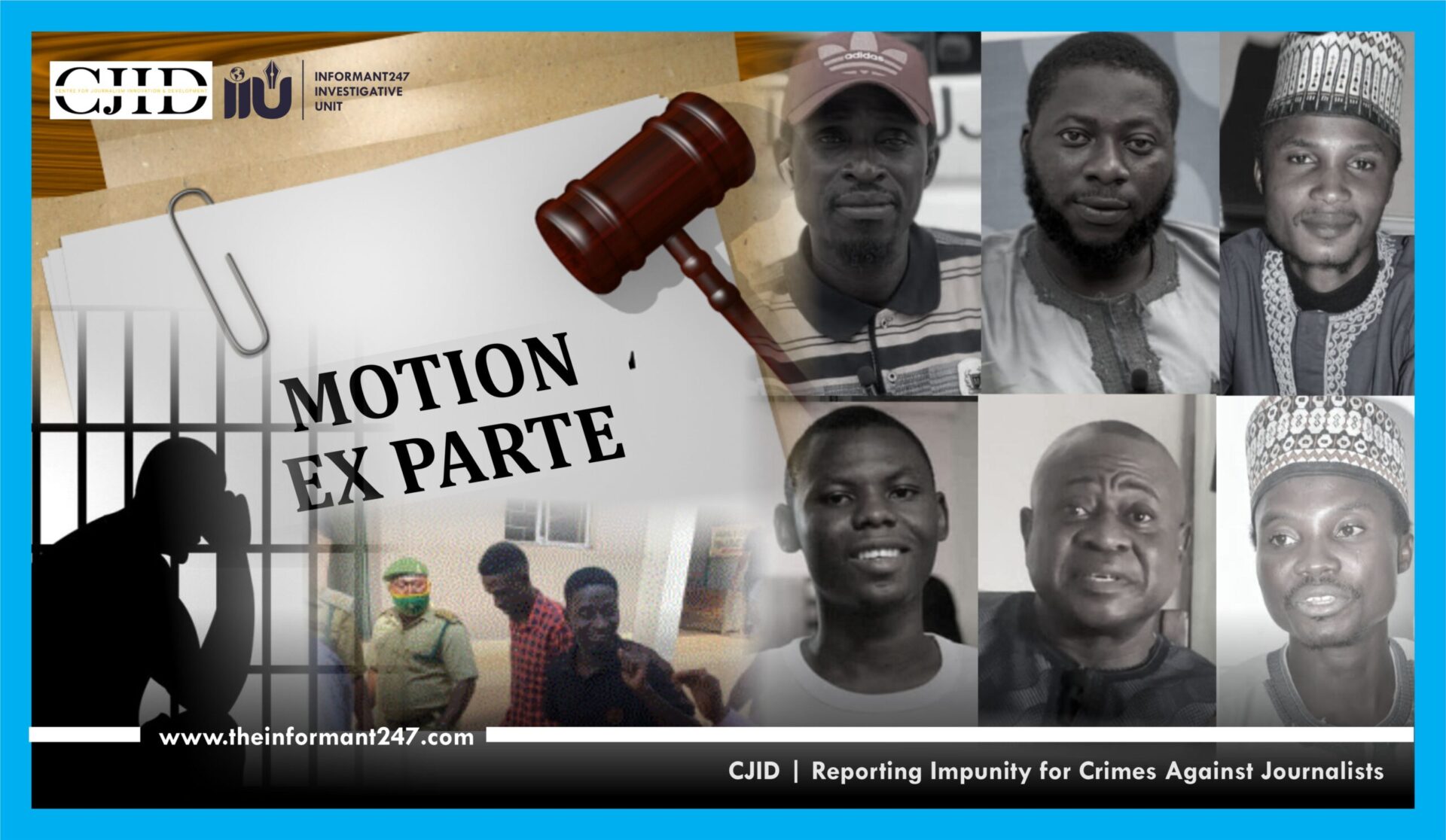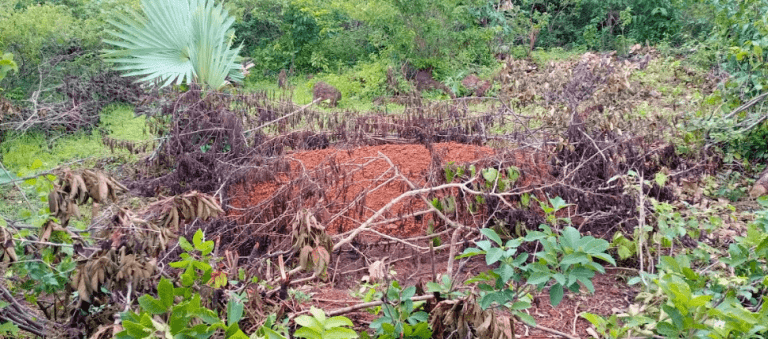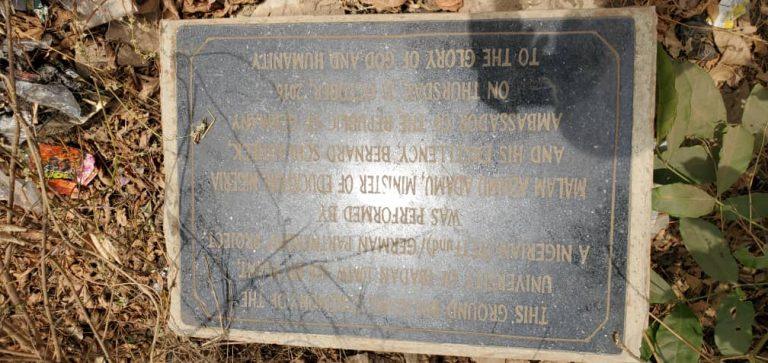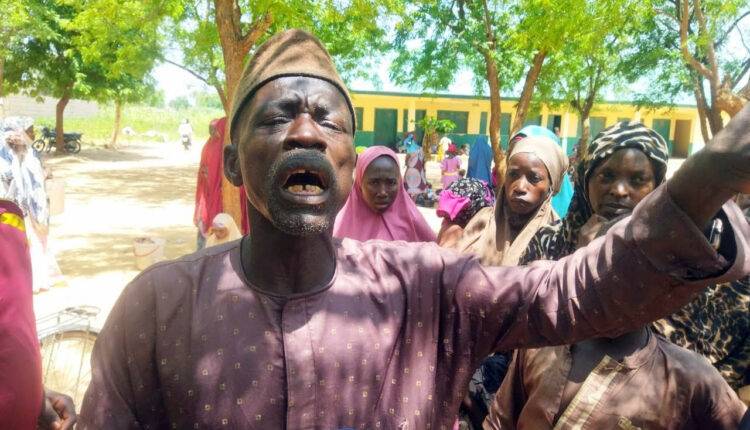In Kwara, police, govt use laws meant for high profile criminal cases to jail journalists
September 2024 was meant to be a joyful time for Oluwatoyin Luqman Bolakale, the publisher of Satcom Media. He was planning his wedding. But at a time he was supposed to be at the studio for pre-shot with his bride-to-be Saliu Muinat, he found himself behind bars.
Oluwatoyin’s ordeal is not an isolated case. His experience shows a worrying pattern of a growing trend in Kwara State, where journalists are increasingly targeted and detained under controversial legal orders known as motion ex parte, a court procedure that allows suspects to be locked up without a fair hearing. In most cases, the court invokes this order against reporters who published a story that holds powerful people to account . Politicians in Kwara State, especially, find this judicial process an effective tool for punishing reporters which causes investigative journalists to regularly censor themselves.
Bolakale’s trouble started with a phone call. He thought the call was from his tailor, but it turned out to be a call from his colleague, Abdulrazaq Babatunde of Just Event Online, asking him to come to the Kwara State Police Headquarters. Both journalists were detained following a petition filed by Jumoke Gafar, a former private secretary to the Governor. Their alleged offence? Publishing a press release issued by a political group.

During questioning, police officers demanded their phones and detained them. Their lawyer, Taofeek Olateju (Esq) tried to obtain a bail on their behalf, but the police frustrated his effort.
The next day, the journalists were taken to court. Their charge sheet however contained a motion ex parte requesting they should be locked up for 21 days pending further investigations, and their lawyer was denied access to speak with them. The Magistrate, AbdulGaniyu Ajia, later granted the remand plea.
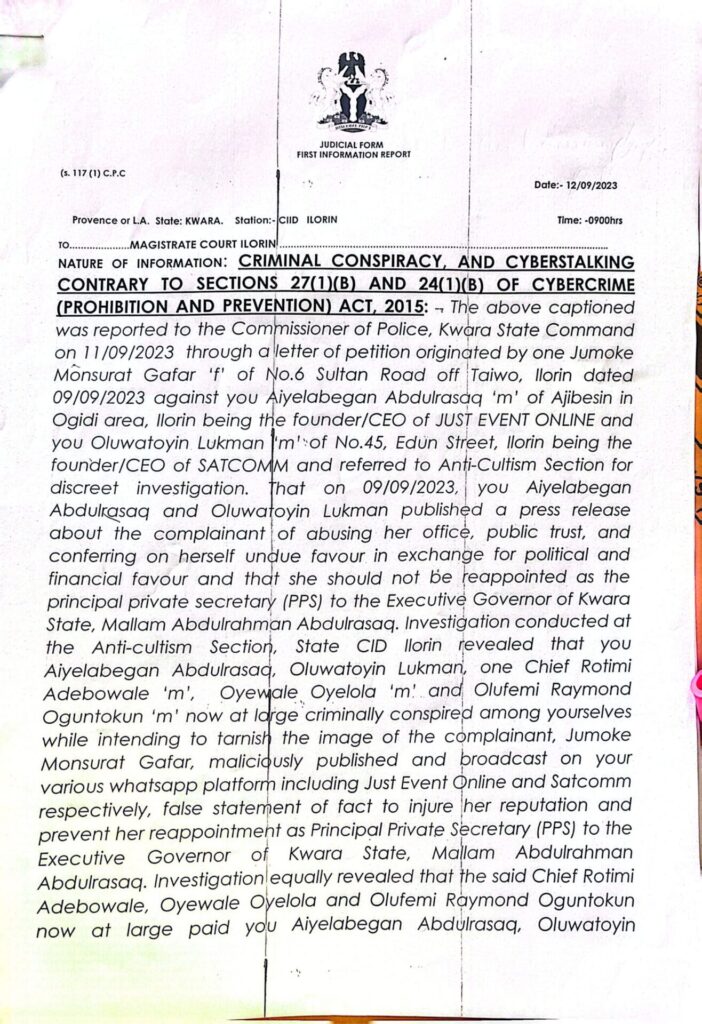
“I was supposed to be planning my wedding, but here I was worrying if I would even make it to the ceremony,” Bolakale said.
The two spent 11 days in detention before the police finally granted them bail. As online publishers, their respective media platforms were greatly affected — Satcom Media couldn’t publish for a week, while Just Event’s metrics dropped significantly within the period.
The case was struck out by the court months later, he said.
‘Not only him’
But it was not only Bolakale and Babatunde, several other journalists in Kwara, have been locked up using this same ex parte motion often after publishing stories that question powerful individuals or government institutions.
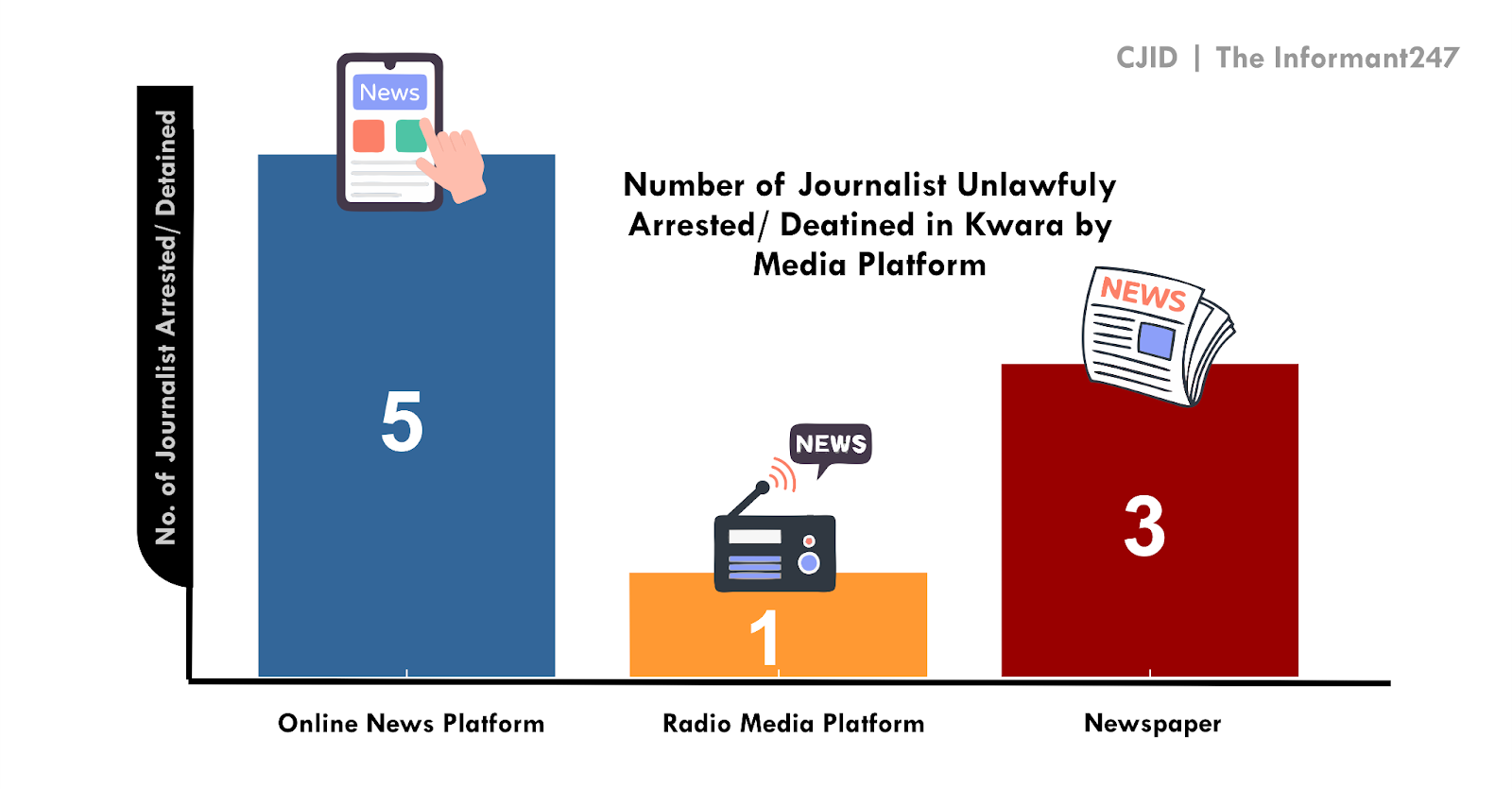
Between 2022 and mid-2024, at least nine journalists in Kwara State were either arrested and detained or summarily prosecuted using similar tactics. The accusations often included cyberstalking, criminal defamation, injurious falsehood, conspiracy, publishing false information, and inciting public disturbance. All coming with motion ex parte seeking their remand in prison. The courts summarily approve remands without hearing from the accused or their counsels.
Remanded in prison for criticising Governor’s aide on WhatsApp
In 2022, Dare Akogun, an investigative journalist, and his brother Abdulrasheed, also a journalist, were invited by the police for posting a message on a WhatsApp group criticising the government and accusing
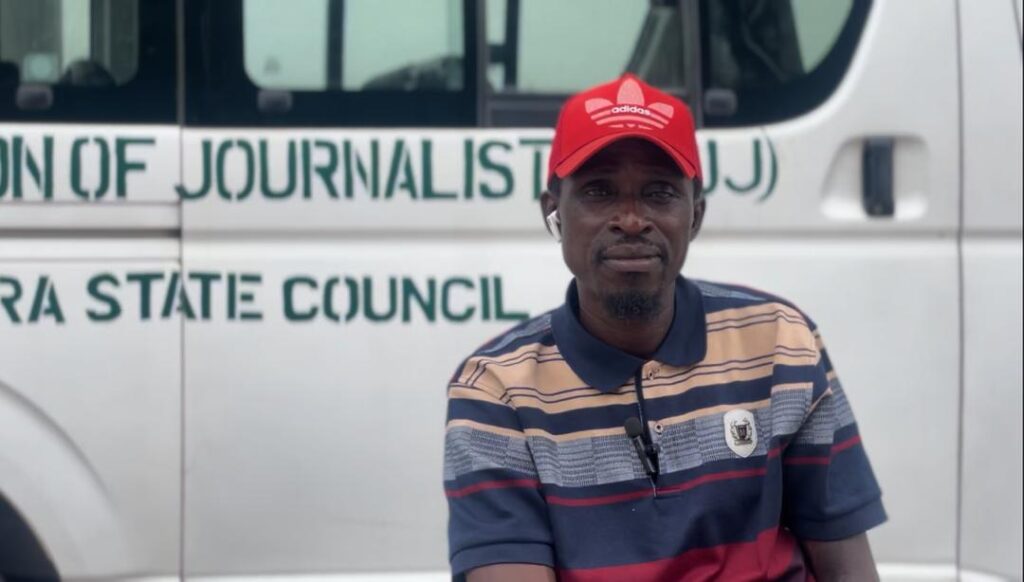
Mr Rafiu Ajakaye, Chief Press Secretary to Kwara State Governor AbdulRahman AbdulRazaq of influencing the council election of the Nigeria Union of Journalists (NUJ).
They honoured the invitation based on the petition submitted by Ajakaye, expecting fair treatment. But things took a different turn.
They asked them to apologize and when the brothers refused, they were detained. The police with a motion ex parte sought that the two brothers be remanded at Mandala correctional centre pending conclusion of their investigation. As it happened in Bolakale’s case, the request was granted.
They spent seven days in prison before they eventually got bail. Akogun said his travail put a toll on his heavily pregnant wife and family.
“I now think twice before publicly criticising this government, or publishing stories that question their policies,” Akogun said.
“That’s not how journalism should be.”
Another victim of Kwara State oppressive tactics is Billy Adedamola, Managing Director of the National Pilot newspaper. In 2023, he was caught in the web of legal intimidation.
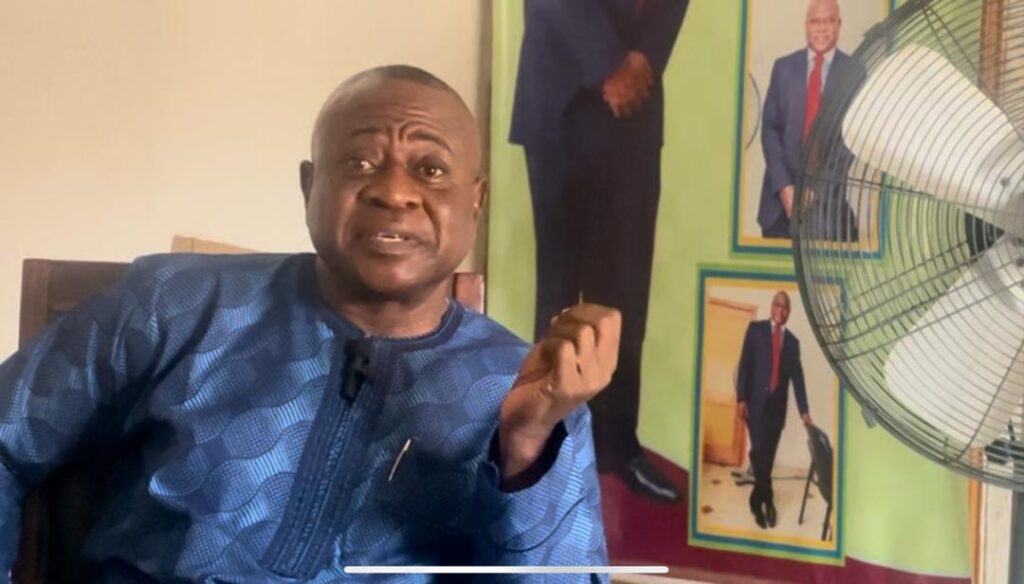
His paper published two exclusive stories, one on political lobbying, and another on faulty government vehicles. The reports were accurate and fair, and the reports included the government’s official responses to ensure balance.

Still, a petition was filed by Mr Fafoluyi Olayinka, the Special Assistant on New Media to Governor AbdulRazaq, against the newspaper’s parent company, Mandate International Publication (Nig.) Ltd. Adedamola and the author of the story, Ahmed Ajikobi, were invited to the police station. According to Adedamola, even the officers admitted there was no wrongdoing. Yet, weeks later, a court summons was delivered to Adedamola, late at night. He and his reporter were asked to appear in court the next morning.
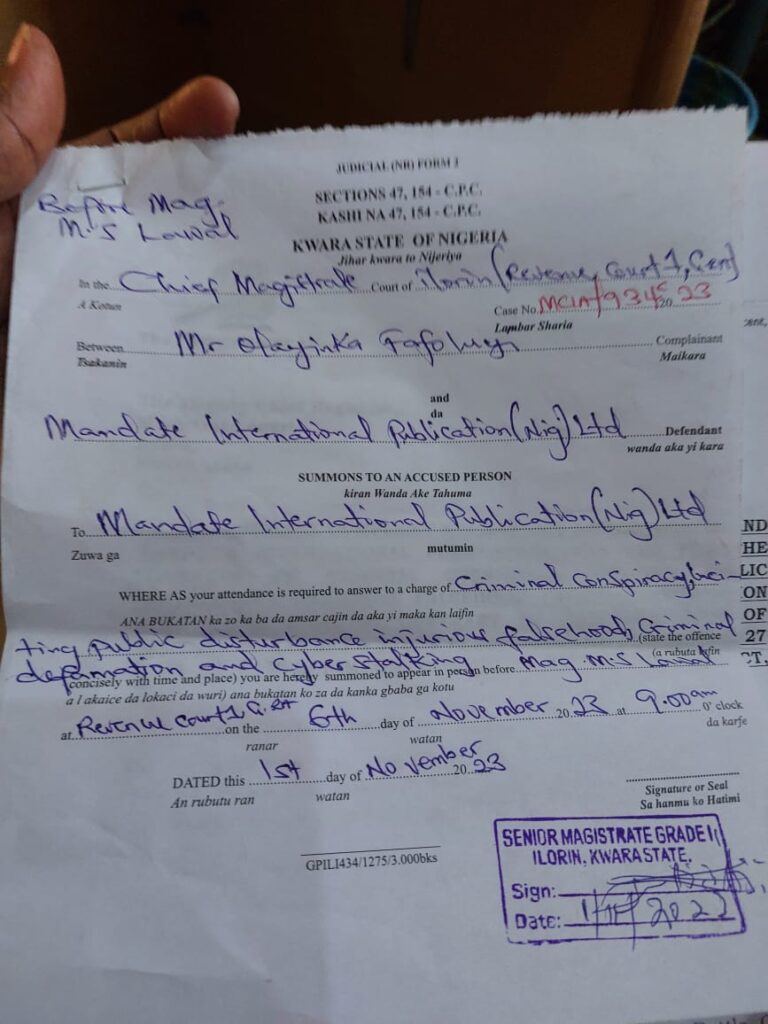
Adedamola, said the case dragged on for seven months before it was finally dismissed, and the complainant never attended any of the court sessions.
“Their objective was never about seeking justice, they were just out to intimidate and silence us,” Adedamola stated.
Lack of evidence, diligent prosecution
For Informant247 investigative newsroom, the story was the same. Adisa Jaji, the managing director and Salihu Ayatullahi, editor-in-chief were arrested in January 2024 after the former published an investigative report that exposed financial mismanagement and commissioning of shoddy projects at the Kwara State Polytechnic. The police accused them of criminal conspiracy, cyberstalking and defamation based on a petition submitted by the institution’s rector, Dr. Abdul Jimoh Muhammed. They were detained overnight under harsh conditions.
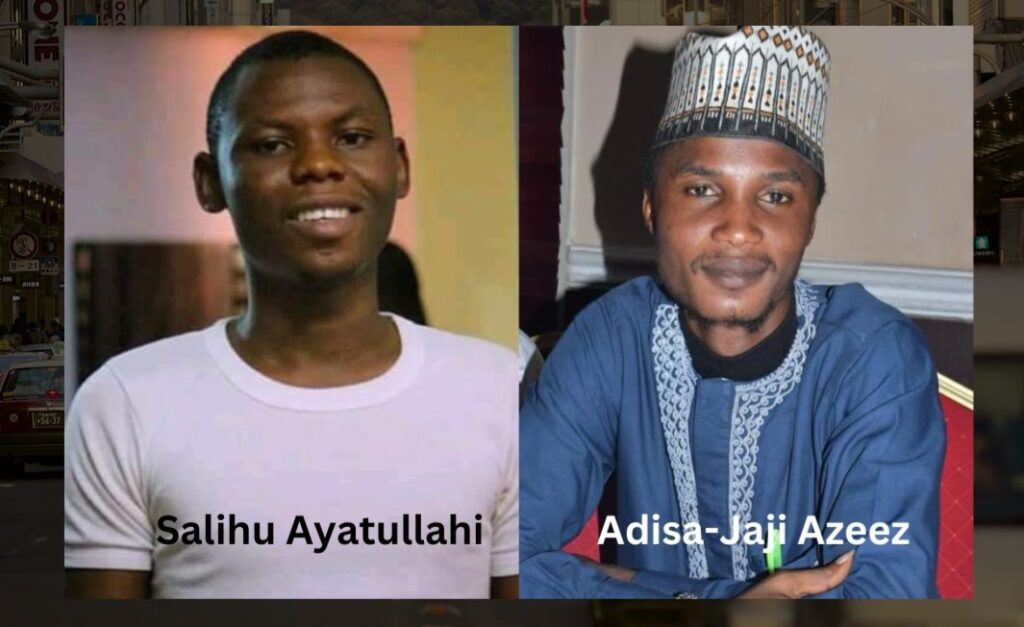
Like every other case, the police sought to remand the journalists in Okekura Correctional Centre for 21 days through a motion ex parte. However, the Magistrate of the court, Monisola Kamson unlike in other previous cases, declined the plea. They were subsequently granted bail.
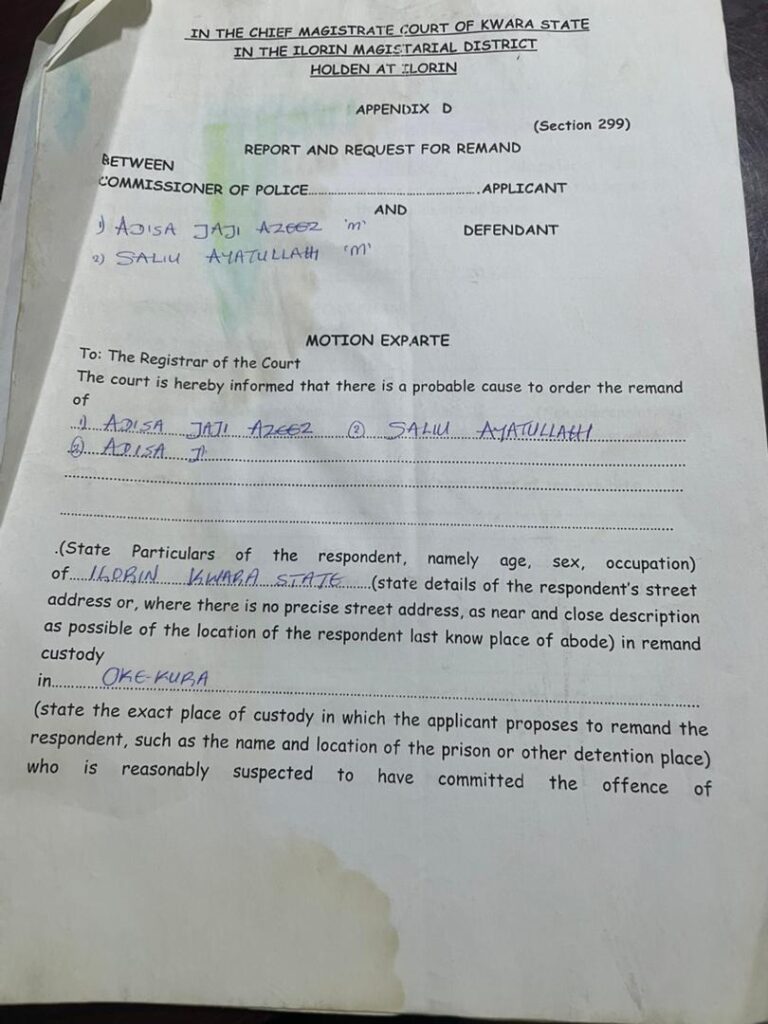
Throughout the 11-month period in which the case lasted, the police repeatedly failed to present any evidence. According to Ayatullahi, the prosecution failed to provide evidence or submit any exhibits for the prosecution.
“There were times the prosecutor didn’t even appear in court, claiming he had no fuel in his car. The court requested severally that the prosecution should submit their evidence and they never did, ” Ayatullahi said.
“They didn’t submit any evidence because they don’t have one in the first place. We have all our evidence and were ready to submit it and prove that our story is factual but they were neither forthcoming nor diligent with the prosecution. It was after then that we realized that they were only interested in using the remand order to break us. That didn’t work so they had to abandon the case.”
Eventually, magistrate Adebayo Qudus who later took over from Kamsonnstruck out the case due to lack of evidence and diligent prosecution.
Law for high profile criminal cases used to prosecute journalists
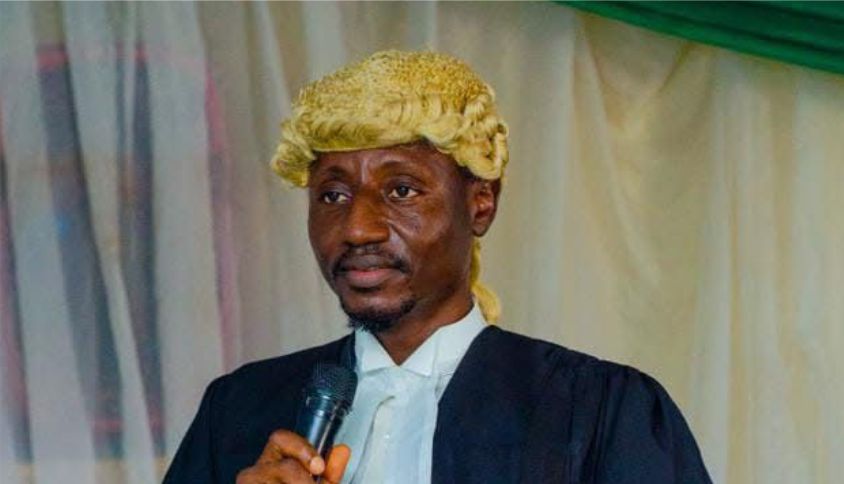
According to legal experts, an ex parte order is a legal order issued by a court based on the request of only one party, without the knowledge or presence of the opposing party. This typically occurs in emergency situations where waiting for the other party to respond could cause irreparable harm.
The instrument behind many of the judicial abuses is Section 299 of the Kwara State Administration of Criminal Justice Law, said Taofeek Olateju, a lawyer with Yusuf O. Ali & Co Chamber.
Olateju said motions ex parte requests are supposed to be used for high profile criminal cases because it enables courts to approve detentions without hearing from the accused or their counsel.
But the law essentially contradicts Section 36(5) of the Nigerian Constitution, which presumes every citizen innocent until proven guilty, he said.
Olateju explained that many police officers and agencies rely on this provision to detain suspects without trial, adding that he had personally witnessed many cases where the provision was used in several non-capital offence, all under the pretext of continuing investigations.
“This practice amounts to punishing individuals before they have even had a fair trial. The courts, especially at the appellate level, have consistently frowned upon such abuse,” he said.
Heargued that once someone is accused of an offence, it should be the responsibility of the complainant to prove it beyond reasonable doubt using credible evidence. But when courts grant these remand orders without hearing from the accused, justice is not being served.
He called on the Kwara State House of Assembly to urgently review and amend this law, adding that if nothing is done, it would continue to be used as a tool against press freedom and open speech.
Journalists express concern over a rising dodgy court orders in Kwara state
Oyewale Oyelola, Secretary of the Association of Kwara Online Media Practitioners (ASKOMP), offered a sobering account of how members of the association have been repeatedly targeted.
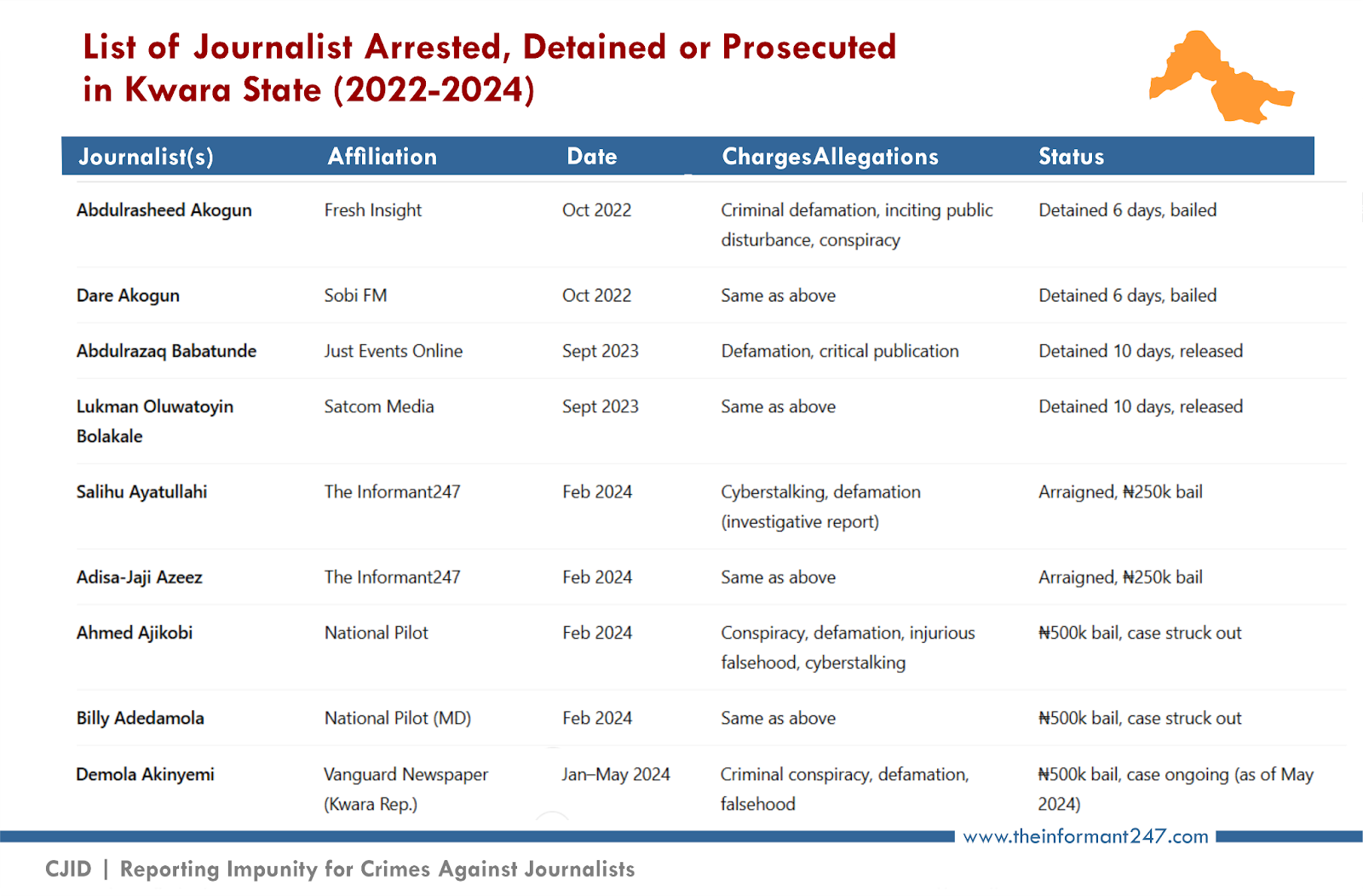
“Over the years, journalists in Kwara have faced a troubling trend where influential figures use the police to detain them. In many of these instances, journalists are not even accused of crimes but are pressured to apologise or to do the bidding of their accusers,”
Oyewale explained that it is common for the police to apply for a motion ex parte, obtain a court order in secret, and then use it to detain journalists without prior notice.
“Police will invite our colleagues often for what appears to be a friendly conversation, only to end up spending the night in a police cell. Even more worrying is that specialized units such as cybercrime and anti-kidnapping squads — units meant for high-risk threats — are being used to interrogate journalists about defamation or opinion-based reports.”
He acknowledged that some judges have been able to rescue journalists by carefully reviewing the merits of each case.
Nonetheless, the systemic misuse of legal procedures and the growing reliance on cybercrime laws to stifle dissent remains a major threat, he said.
“I think the laws should be further reviewed.”
Kwara Police, Justice Ministry Ignore Media Queries on Press Freedom Clampdown
Attempts to get the reactions of both the state Ministry of Justice and Police Command were to no avail as the officials of the two institutions ignored calls and text messages.

Although the Kwara State Police Public Relations Officer (PPRO), Ejire-Adeyemi Toun asked The Informant247 to drop SMS, she did not respond to the message and calls.
For the State Ministry of Justice, when asked on the number of successful prosecutions involving journalists in the state, the Director of Public Prosecution, Muhammed Ayoola Idowu MAI Akande (Esq) refused to comment. He also refused to respond to questions on why his ministry and the police are allegedly using vague charges to remand journalists and suppress press freedom.
He said, “I can’t disclose this information without government approval. You can only direct it to the Attorney-General. He’s the head. I wish I could discuss it, but I don’t have the authority to answer the question.
“You know the Attorney General is the head. So, call him.”
Meanwhile, efforts to get comment from the Attorney General, Senior Ibrahim Sulyman proved abortive as he neither picked his calls nor replied to texts sent to him.
Nationwide Pattern of Intimidation: Arrests of Journalists Spread Beyond Kwara
Data on journalist arrests and detentions across Nigeria verified and documented by the Press Attack Tracker, obtained by this reporter reveals troubling trends in press freedom violations.
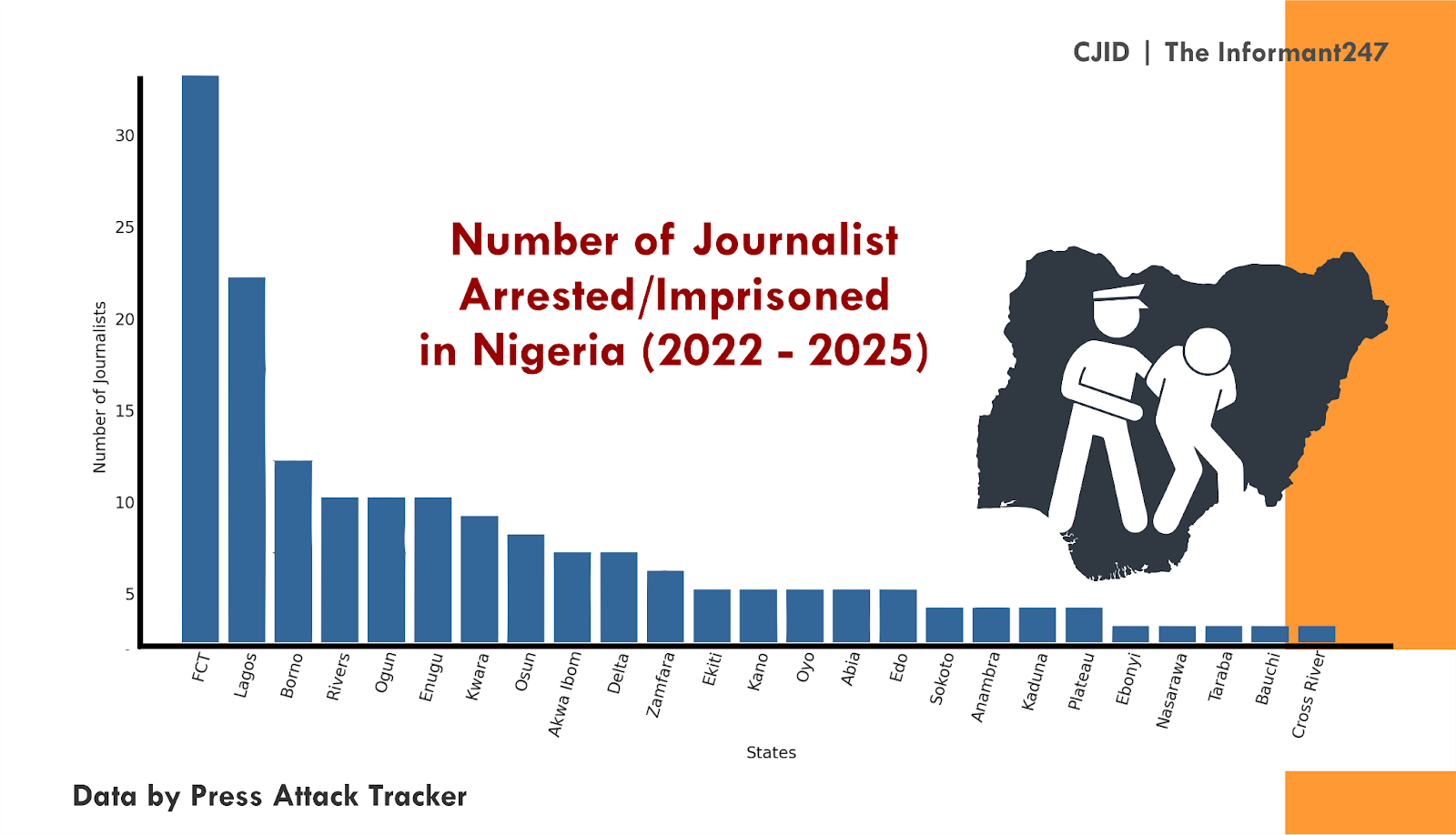
The Federal Capital Territory (FCT) leads with a staggering 31 cases, followed by Lagos with 20, and Borno with 10. Other high-ranking states include Rivers, Enugu, and Ogun with 8 cases each. These figures suggest that areas with significant political or security activity tend to see more clashes between authorities and the press, likely due to increased scrutiny from journalists investigating governance, corruption, or human rights abuses.
States like Kwara (7), Osun (6), Akwa Ibom and Delta (5 each) also reflect a concerning pattern of using arrests or detentions as tools of intimidation. Even in states with fewer incidents, such as Ebonyi, Nasarawa, or Taraba, the mere presence of such cases signals a broader national problem.
These arrests often rely on vague charges such as defamation, cyberstalking, or conspiracy—terms frequently weaponised to silence critical voices. The geographic spread of these incidents underscores that press freedom is under threat not just in conflict zones or political capitals but in diverse regions.
“Using motion ex parte to lock up journalists is not justice, it’s a weapon against the press,” said Olateju. “The use of experte order by Kwara courts mocks the right to free speech.”
This reporting was completed with the support of the Centre for Journalism Innovation and Development, CJID. Report Edited by Ajibola Amzat

